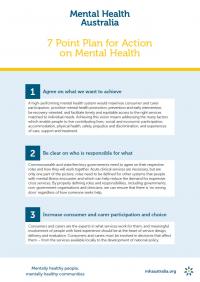Seven Point Plan for Action on Mental Health
 1. Agree on what we want to achieve
1. Agree on what we want to achieve
A high-performing mental health system would maximise consumer and carer participation, prioritise mental health promotion, prevention and early intervention, be recovery‑oriented, and facilitate timely and equitable access to the right services matched to individual needs. Achieving this vision means addressing the many factors which enable people to live contributing lives: social and economic participation, accommodation, physical health, safety, prejudice and discrimination, and experiences of care, support and treatment.
2. Be clear on who is responsible for what
Commonwealth and state/territory governments need to agree on their respective roles and how they will work together. Acute clinical services are necessary, but are only one part of the picture; roles need to be defined for other systems that people with mental illness encounter and which can help reduce the demand for expensive crisis services. By properly defining roles and responsibilities, including governments, non‑government organisations and clinicians, we can ensure that there is ‘no wrong door’ regardless of how someone seeks help.
3. Increase consumer and carer participation and choice
Consumers and carers are the experts in what services work for them, and meaningful involvement of people with lived experience should be at the heart of service design, delivery and evaluation. Consumers and carers must be involved in decisions that affect them – from the services available locally to the development of national policy.
4. Match services to need
For the mental health system to respond with effective, timely and evidence-based interventions, we need to ensure service providers, clinicians and other professionals have the knowledge, skills and resources to connect people to the right help at the right time. We need to ensure that clinical services are linked with the right community services, psychosocial supports and opportunities for self-help, and that those services are available across the full spectrum of need.
5. Get the incentives right to drive better outcomes
The way governments fund service providers needs major reform. Services delivered in the community are far cheaper and often more effective than treating people in hospital. Our entire system of funding mental health services – from existing arrangements like Medicare, the PBS and block grants to innovative models like individualised funding – should reduce fragmentation rather than create it and should promote best practice service delivery and collaboration. Rewarding activity with no link to improved outcomes risks both jeopardising life outcomes for those who experience mental illness and the misallocation of scarce resources.
6. Invest at the right time to achieve the greatest benefit
Improving mental health outcomes will increase national productivity and participation, reaping major economic dividends. We need to invest in mental health promotion, prevention and early intervention to encourage help‑seeking, challenge prejudice and discrimination, and avoid crisis wherever possible. Empowering consumers and carers to help themselves through new technology will yield high returns on investment and allow clinicians to help those with the highest needs.
7. Keep governments and services accountable
At the moment we don’t have a complete picture of how much governments spend on services for people with mental illness or how effective that spending is. We need an independent mechanism to report on what governments are investing in and whether those investments are assisting consumers and carers to lead contributing lives.
| Attachment | Kind | Size |
|---|---|---|
| 115.12 KB |




